Bitumen Penetration Grade 40/50
Bitumen Penetration Grade 40/50 Description
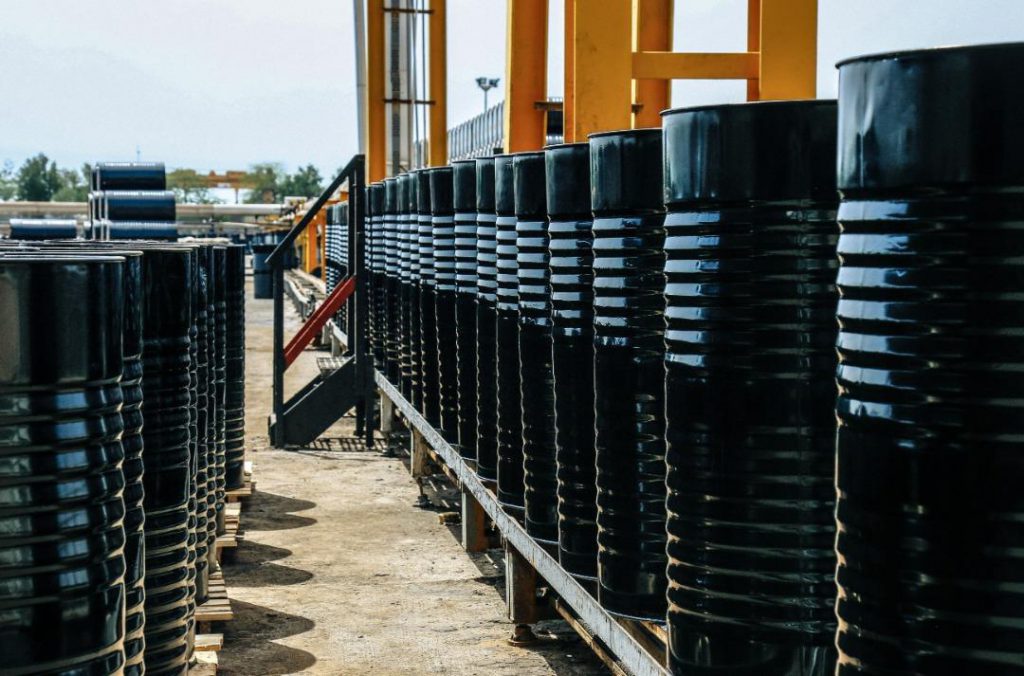
Bitumen penetration grade 40/50 bitumen means the penetration value is in the range 40 to 50 at standard test conditions which commonly used as a Paving Grade. Bitumen is applicable for the production of hot mix asphalt for bases and pavements and for road construction. Penetration Grade Bitumen supplied by HJ Oil is produced through aeration on vacuum bottom (the raw material used for making bitumen left in vacuum distillation column in oil refineries) in bitumen production units. Its penetration grade ( the measure of bitumen hardness) is between 40 to 50. Bitumen is specified by the penetration and softening point test. Designing is by penetration range only. The penetration grade bitumen has a thermoplastic property which causes the material to soften at high temperatures and to harden at lower temperatures. This unique temperature-viscosity relationship is important when determining the performance parameters such as the adhesion, rheology, durability, and application temperatures of bitumen.
The Bitumen mode is dependent on temperature. The temperature-vs-stiffness relationship of bitumen is dependent on the type of crude oil and its refining method. Bitumen penetration grade 40/50 is semi-hard penetration grade bitumen used as a paving grade bitumen which is suitable for road construction and repair. It is also used for the production of asphalt pavements with the technical specification. This grade of bitumen is mainly used in the manufacturing of hot mix asphalt for bases and wearing courses. Bitumen 40/50 is one of the most used bitumen grades and it’s a basic material for all other bituminous products.
Bitumen Penetration Grade 40/50 Applications
Bitumen 40/50 is Suitable for road construction and for the asphalt pavements with superior properties. This type of bitumen used in the manufacture of hot mix asphalt for bases and wearing courses and the main usage of this product is used in the road in tropical regions. the bitumen is provided during the presses of oxidation of vacuum bottom in bitumen production units. Due to its high air blowing and penetration, it is used in tropical areas with the Warm weather. It is not softened at high temperatures and does not fail its qualities.
Guaranty and safety of bitumen 40/50
HJ Oil guaranty the quality of bitumen penetration grade 40/50 with the arrangement of the international inspector to check quality and quantity during the loading to the vessel and controlling the production by QC by batch test report before shipping. HJ Oil guarantees the quality to meet with ASTM.
Bitumen Penetration Grade 40/50 Specifications
| Bitumen 40/50 | Test method | Unit | Specification |
| Specific gravity @ 25°c | ASTM D70 | Kg/cm3 | 1.01/1.06 |
| Penetration @ 25°c | ASTM D5 | mm/10 | 40/50 |
| Softening point °c | ASTM D36 | °C | 52/60 |
| Ductility @25 °c | ASTM D113 | cm | 100 min |
| Loss on heating(wt) % | ASTM D6 | wt % | 0.2 max |
| Drop in penetration after heating % | ASTM D5-D6 | % | 20 max |
| Flash point °c | ASTM D92 | °C | 250 min |
| Solubility is CS2(wt) % | ASTM D4 | wt % | 99.5 min |
| Spot test | A.A.S.H.O.T102 | Negative |
Bitumen Penetration Grade 30/40
Bitumen Penetration Grade 30/40 Description
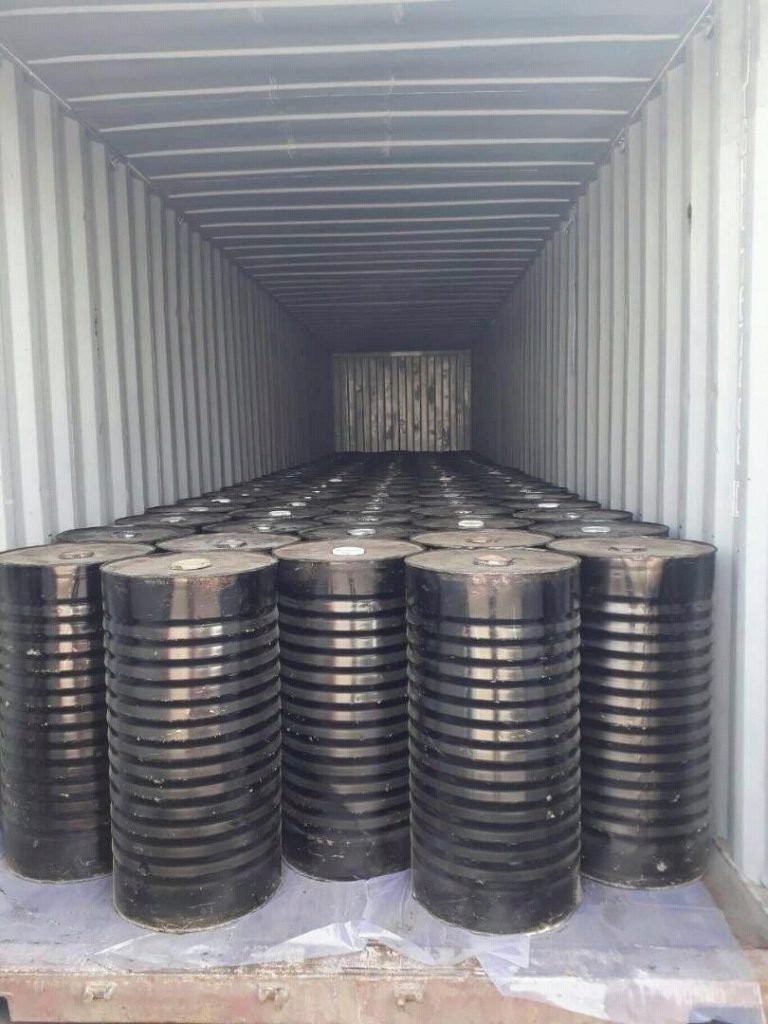
The bitumen penetration grade 30/40 supplied by HJ Oil is produced from the vacuum residue (short residue) feedstock. penetration grade bitumen is specified by the penetration and softening point test. designation by penetration range only. The penetration grade bitumen has a thermoplastic property that causes the material to soften at high temperatures and to harden at low temperatures. It is a kind of bitumen and standard penetration grade. This type is petroleum grade bitumen, manufactured from fractional- vacuum destination of crude oil.
The Bitumen mode is dependent on temperature. The temperature-vs-stiffness relationship of bitumen is dependent on the type of crude oil and its refining method. Bitumen penetration grade 30/40 is semi-hard penetration grade bitumen used as a paving grade bitumen which is suitable for road construction and repair. It is also used for the production of asphalt pavements with the below technical specification. This grade of bitumen is mainly used in the manufacturing of hot mix asphalt for bases and wearing courses. This Bitumen is one of the most used bitumen grades and it’s a basic material for all other bituminous products
Penetration determines the hardness of bitumen by measuring the depth to which a standard loaded the needle will vertically penetrate in 5 seconds, in a sample of bitumen maintained at a temperature of 25 degrees Celsius.
Bitumen 30/40 Applications
Bitumen 30/40 is suitable for road construction and repair for the asphalt pavements with superior properties. This type of bitumen used in the manufacture of hot mix asphalt for bases and wearing courses.
Guaranty & Safety of 30/40
HJ Oil guarantees the quality of bitumen penetration grade 30/40 with the arrangement of the international inspector to check quality and quantity during the loading to the vessel and controlling the production by QC by batch test report before shipping. HJ Oil guarantees the quality to meet with ASTM.
Bitumen Penetration grade 30/40 Specifications
| Bitumen 30/40 | Test method | Unit | Specification |
| Specific gravity @ 25°c | ASTM D70 | Kg/cm3 | 1.01/1.06 |
| Penetration @ 25°c | ASTM D5 | mm/10 | 30/40 |
| Softening point °c | ASTM D36 | °C | 55/63 |
| Ductility @25 °c | ASTM D113 | cm | 100 min |
| Loss on heating(wt) % | ASTM D6 | wt % | 0.2 max |
| Drop in penetration after heating % | ASTM D5-D6 | % | 20 max |
| Flash point °c | ASTM D92 | °C | 250 min |
| Solubility is CS2(wt) % | ASTM D4 | wt % | 99.5 min |
| Spot test | A.A.S.H.O.T102 | Negative |

Bitumen Penetration Grade 10/20
Bitumen Penetration Grade 10/20 Description
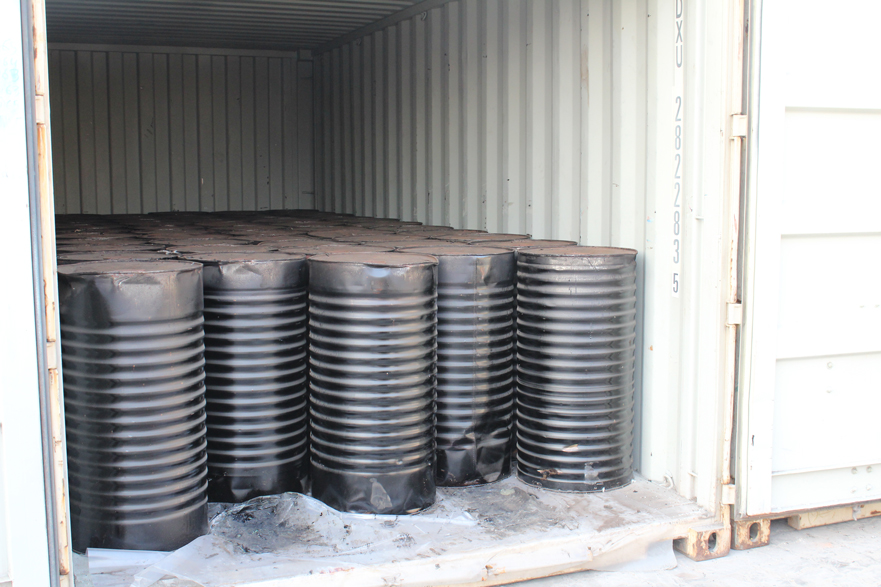
Bitumen penetration grade 10/20 ensures long-term savings because it allows for a thinner pavement design, which uses up to 30% less asphalt than traditional designs while ensuring extended pavement life. HJ exporting bitumen 10/20 its penetration hard grade and softening between 10 to 20. bitumen 10/20 is hard penetration grade bitumen using as paving grade bitumen suitable for road construction and repair also for the production of asphalt pavements with the below technical specification. This grade of bitumen is mainly used in the manufacture of hot mix asphalt for bases and wearing courses. It is a kind of hard penetration grade bitumen that is provided during the process of oxidation of vacuum bottom the bitumen production that derives from distillation tower residue in vacuum oil refineries at the bitumen production unit.
Penetration Grade Bitumen is a standard bitumen usually used as a Paving Grade Bitumen essential for road construction and for the production of asphalt pavements with superior properties, and it’s very important once it bounds the aggregates and creates a unique cohesion and stability to the bituminous mix.
Bitumen 10/20 Applications
Bitumen 10/20 is suitable for road construction and repair for the asphalt pavements with superior properties. This type of bitumen used in the manufacture of hot mix asphalt for bases and wearing courses and the bitumen 10/20 is also for the production of pavements.
Guaranty and Safety of Bitumen 10/20
HJ Oil guarantees the quality of bitumen 10/20 with the arrangement of the international inspectors to check quality and quantity during the loading to the vessel and controlling the production by QC by batch test report before shipping. HJ Oil Company guarantees the quality to meet with ASTM.
Bitumen Penetration 10/20 Specifications
| Bitumen 10/20 | Test method | Unit | Specification |
| Specific gravity @ 25°c | ASTM D70 | Kg/cm3 | 1.01/1.06 |
| Penetration @ 25°c | ASTM D5 | Mm/10 | 10/20 |
| Softening point °c | ASTM D36 | °C | 58/66 |
| Ductility @25 °c | ASTM D113 | Cm | 100 min |
| Loss on heating(wt) % | ASTM D6 | wt % | 0.2 max |
| Drop in penetration after heating % | ASTM D5-D6 | % | 20 max |
| Flashpoint c | ASTM D92 | °C | 250 min |
| Solubility is CS2(wt) % | ASTM D4 | wt % | 99.5 max |
| Spot test | A.a.s.h.o.t102 | Negative |
Packing of Bitumen Penetration Grade 10/20
Bitumen 10/20 is commonly packed in new steel drums, 150, 180 & 220 Kg barrels and Jumbo Bags or Bitubag and 10 & 20kg Tubular carton.
Viscosity Grade Bitumen 40
Viscosity Grade Bitumen 40 Description

Viscosity Grade Bitumen 40 is categorized according to Viscosity (degree of fluidity) grading. The higher the grade, the stiffer the Bitumen. In Viscosity Grade, Viscosity tests are conducted at 60°C and 135°C, which represents the temperature of the road surface during summer and mixing temperature respectively. The penetration at 25°C, which is the annual average pavement temperature, has been also retained in Specifications.
Viscosity Grade Bitumen 40 is used in highly stressed areas such as intersections, near toll booths, and truck parking lots in lieu of old 30/40 Penetration grade. Due to its higher viscosity, stiffer Bitumen mixes can be produced to improve resistance to shoving and other problems associated with higher temperatures and heavy traffic loads.
Viscosity Grade Bitumen 40 Applications
Viscosity Grade Bitumen 40 (Asphalt) is a standard grade Bitumen usually used as a Paving Grade Bitumen suitable for road construction and for the production of asphalt pavements with superior properties. This grade of Bitumen is mainly used in the manufacture of hot mix asphalt for bases and wearing courses and possesses characteristics and qualities unique sand quite different from other agents. They achieve very flexible and tenacious connections with other materials due mainly to the viscoelastic response of bitumen, which behavior depends on how fast charges are applied. Viscosity Grade Bitumen supplied by Tavoil is petroleum grade bitumen, manufactured from fractional / vacuum distillation of crude oil, which practical appliance and behavior vary according to its temperature. The Bitumen supplied by Tavoil is produced from the vacuum residue (short residue) feedstock. Viscosity Grade bitumens are specified by the methods described in ASTM Standard D3381–09 and AASHTO M226-80 (2008). Viscosity Graded specifications cover bitumen (asphalt) graded by Viscosity at 60 C (140 °F).
Used in ;
Airport
Highway
runway
Footway
Racetracks
VG-40 Packing
New Steel Drum, Bulk, and other packings based on the customers’ demands.
VG-40 Specification
| PROPERTIES | SPECIFICATIONS |
|---|---|
| Absolute Viscosity, 60°C, poises, min | 3200 |
| Kinematic Viscosity, 135°C, CST, min | 400 |
| Flash point, C, min | 220 |
| Solubility in trichloroethylene, %, min | 99.0 |
| Penetration at 25°C | 40-60 |
| Softening point, C, min | 50 |
| Viscosity ratio at 60°C, max | 4.0 |
| Ductility at 25°C, cm, min, (after thin film over test) | 25 |
Viscosity Grade Bitumen 30
Viscosity Grade Bitumen 30 Description

Viscosity Grade Bitumen 30 is categorized according to Viscosity (degree of fluidity) grading. The higher the grade, the stiffer the Bitumen. In Viscosity Grade, Viscosity tests are conducted at 60°C and 135°C, which represents the temperature of the road surface during summer and mixing temperature respectively. The penetration at 25°C, which is the annual average pavement temperature, has been also retained in Specifications.
It is a kind of bitumen, which is produced during the process of oxidation of the vacuum bottom in distillation tower and is categorized based on its viscosity grade. The main common usage of bitumen Viscosity Grade Bitumen 30 is primarily used to construct extra heavy duty Bitumen pavements that need to endure substantial traffic loads. Also, VG-30 is in road construction, waterproofing, building construction industries, and also in cutback bitumen production. It can be used in lieu of 60/70 Penetration grade. It is the most suitable for use in hot and rainy weather conditions and suitable to be used in mild regions.
Viscosity Grade Bitumen 30 Applications
Viscosity Grade Bitumen (Asphalt) is a standard grade Bitumen usually used as a Paving Grade Bitumen suitable for road construction and for the production of asphalt pavements with superior properties. This grade of Bitumen is mainly used in the manufacture of hot mix asphalt for bases and wearing courses and possesses characteristics and qualities unique sand quite different from other agents. They achieve very flexible and tenacious connections with other materials due mainly to the viscoelastic response of bitumen, which behavior depends on how fast charges are applied. Viscosity Grade Bitumen supplied by Tavoil is petroleum grade bitumen, manufactured from fractional / vacuum distillation of crude oil, which practical appliance and behavior vary according to its temperature. The Bitumen supplied by Tavoil is produced from the vacuum residue (short residue) feedstock. Viscosity Grade bitumens are specified by the methods described in ASTM Standard D3381–09 and AASHTO M226-80 (2008). Viscosity Graded specifications cover bitumen (asphalt) graded by Viscosity at 60 C (140 °F).
Used in ;
Pedestrian Ways
Car parks
Tennis courts
Roofing
Damp proofing
Dams
Reservoir and pool
VG-30 Packing
New Steel Drum, Bulk, and other packings based on the customers’ demands.
VG-30 Specification
| PROPERTIES | SPECIFICATIONS |
|---|---|
| Absolute Viscosity, 60°C, poises, min | 2400 |
| Kinematic Viscosity, 135°C, CST, min | 350 |
| Flash point, C, min | 220 |
| Solubility in trichloroethylene, %, min | 99.0 |
| Penetration at 25°C | 50-70 |
| Softening point, C, min | 47 |
| Viscosity ratio at 60°C, max | 4.0 |
| Ductility at 25°C, cm, min, (after thin film over test) | 40 |
Viscosity Grade Bitumen 20
Viscosity Grade Bitumen 20 Description

Viscosity grade bitumen 20 are categorized according to Viscosity (degree of fluidity) grading. The higher the grade, the stiffer the Bitumen. In Viscosity Grade, Viscosity tests are conducted at 60°C and 135°C, which represents the temperature of the road surface during summer and mixing temperature respectively. The penetration at 25°C, which is the annual average pavement temperature, has been also retained in Specifications.
Viscosity Grade Bitumen 20 is used for paving in cold climate & high altitude regions.
Viscosity Grade Bitumen 20 Applications
Viscosity Grade Bitumen (Asphalt) is a standard grade Bitumen usually used as a Paving Grade Bitumen suitable for road construction and for the production of asphalt pavements with superior properties. This grade of Bitumen is mainly used in the manufacture of hot mix asphalt for bases and wearing courses and possesses characteristics and qualities unique sand quite different from other agents. They achieve very flexible and tenacious connections with other materials due mainly to the viscoelastic response of bitumen, which behavior depends on how fast charges are applied. Viscosity Grade Bitumen supplied by Tavoil is petroleum grade bitumen, manufactured from fractional / vacuum distillation of crude oil, which practical appliance and behavior vary according to its temperature. The Bitumen supplied by Tavoil is produced from the vacuum residue (short residue) feedstock. Viscosity Grade bitumens are specified by the methods described in ASTM Standard D3381–09 and AASHTO M226-80 (2008). Viscosity Graded specifications cover bitumen (asphalt) graded by Viscosity at 60 C (140 °F).
Used in ;
linings
Soundproofing
Pipe coatings
Cable Coatings
Paints Building
Water Proofing
Tile underlying
waterproofing
Newspaper Ink
VG-20 Packing
New Steel Drum, Bulk, and other packings based on the customers’ demands.
VG-20 Specification
| PROPERTIES | SPECIFICATIONS |
|---|---|
| Absolute Viscosity, 60°C, poises, min | 1600 |
| Kinematic Viscosity, 135°C, CST, min | 300 |
| Flash point, C, min | 220 |
| Solubility in trichloroethylene, %, min | 99.0 |
| Penetration at 25°C | 60-80 |
| Softening point, C, min | 45 |
| Viscosity ratio at 60°C, max | 4.0 |
| Ductility at 25°C, cm, min, (after thin film over test) | 50 |
Viscosity Grade Bitumen 10
Viscosity Grade Bitumen 10 Description

Viscosity grade 10 of bitumens are categorized according to Viscosity (degree of fluidity) grading. The higher the grade, the stiffer the Bitumen. In Viscosity Grade, Viscosity tests are conducted at 60°C and 135°C, which represents the temperature of the road surface during summer and mixing temperature respectively. The penetration at 25°C, which is the annual average pavement temperature, has been also retained in Specifications. Viscosity Grade Bitumen 10 is mostly used in spraying applications such as paving in cold regions. VG 10 is an alternative for bitumen 80/100 penetration grade. It also acts as a feedstock in manufacturing Bitumen Emulsion and Modified Bitumen products.
Viscosity grade of bitumen can be done on original (as-supplied) asphalt binder samples (called AC grading) or aged residue samples (called AR grading). The AR viscosity test is based on the viscosity of aged residue from the rolling thin film oven test. With AC grading, the asphalt binder is characterized by the properties it possesses before it undergoes the HMA manufacturing process. The AR grading system is an attempt to simulate asphalt binder properties after it undergoes a typical HMA manufacturing process and thus, it should be more representative of how asphalt binder behaves in HMA pavements. Table 1 lists key advantages and disadvantages of the viscosity grading system.
Viscosity Grade Bitumen 10 Applications
Spraying applications, Paving
Packing
New Steel Drum, Bulk, and other packings based on the customers’ demands.
VG-10 Specification
| PROPERTIES | SPECIFICATIONS |
|---|---|
| Absolute Viscosity, 60°C, poises, min | 800 |
| Kinematic Viscosity, 135°C, CST, min | 250 |
| Flash point, C, min | 220 |
| Solubility in trichloroethylene, %, min | 99.0 |
| Penetration at 25°C | 80-100 |
| Softening point, C, min | 40 |
| Viscosity ratio at 60°C, max | 4.0 |
| Ductility at 25°C, cm, min, (after thin film over test) | 75 |
Bitumen C600
Bitumen C600 Description
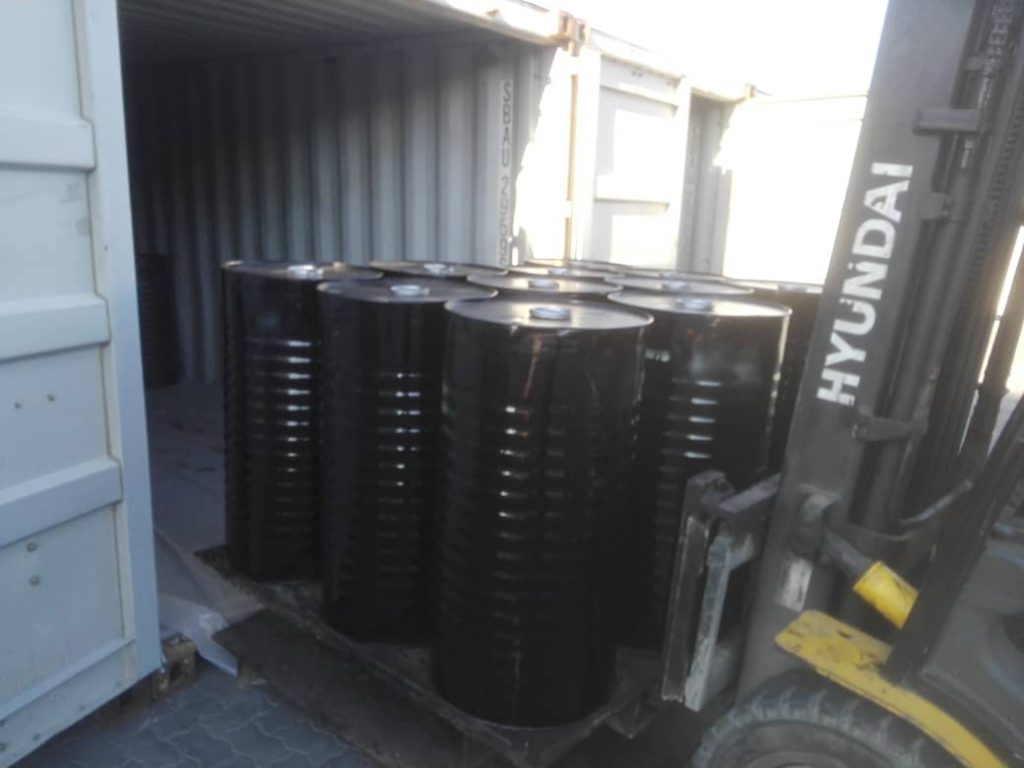
C600 is a paving grade bitumen manufactured to AS 2008 Table 2.2 and is primarily suitable for use in high modulus
base course asphalt.
Summary of benefits
The Viva standards to which C600 bitumen is made result in a very consistent bitumen with predictable handling and performance characteristics
Bitumen C600 Applications
C600 bitumen is the hardest paving grade bitumen available in Australia and is mainly used to produce high modulus
asphalt. Heavy-duty asphalt pavements need to be designed to accommodate significant traffic loadings for up to 40
years without exhibiting structural failure and hence, need to be constructed using appropriate materials. The load
spreading characteristics of pavement layers are governed by their stiffness and C600 bitumen facilitates the production of high modulus asphalt.
| Mixing Temperature | Holding time at Mixing Temperature | Medium term storage temperature | Medium term storage time | Maximum safe handling temperature |
| 175 – 185°C | 14 days | 130-150°C | 30 days | 190°C |
Health & safety
C600 is unlikely to present any significant health or safety hazard when properly used in the recommended
an application where good standards of industrial practice are maintained.
Bitumen C600 Typical characteristics
| Description | Units | Methods | Typical |
| Viscosity at 60° | Pa.s | AS 2341.2 | 600 |
| Viscosity at 135° | Pa.s | AS 2341.2 | 0.7 |
| Pen at 25° | dmm | AS 2341.12 | min 20 |
| Flashpoint | °C | AS 2341.14 | max 250 |
| Viscosity of residue at 60° C (% of original) | Pa.s | AS 2341.2 | max 300 |
Bitumen, also known as asphalt in the United States, is a substance that forms through the distillation of crude oil. It has waterproofing and adhesive properties. Bitumen production through distillation removes lighter crude oil components, such as gasoline and diesel, leaving the “heavier” Asphalt behind. The producer often refines it several times to improve its grade. Bitumen can also occur in nature: Deposits of naturally occurring bitumen form at the bottom of ancient lakes, where prehistoric organisms have since decayed and have been subjected to heat and pressure.
Bitumen C450
Bitumen C450 Description
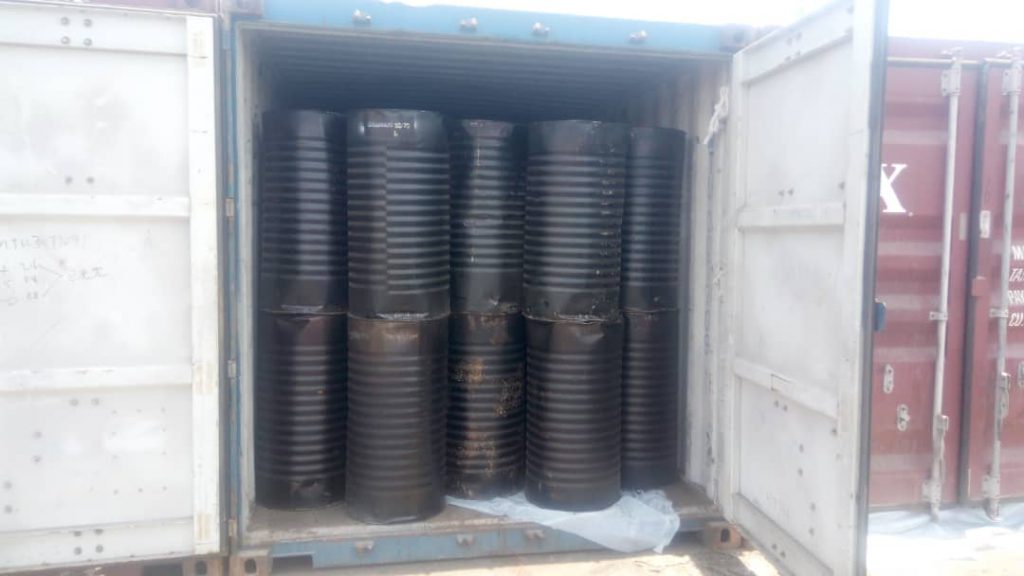
Bitumen C450 is a paving grade bitumen manufactured to comply with AS2008 Table 2.2 and is suitable for use in heavily trafficked asphalt.
Bitumen C450 Applications
C450 was originally a development from the Roads and Maritime Services in New South Wales and was incorporated into the 2012 revision of the national bitumen standard AS2008. C450 has been formulated to meet the viscosity requirements of AS2008 Table 2.2 whilst retaining excellent asphalt workability characteristics. The target applications are asphalt wearing courses and base courses for heavily trafficked pavements.
Asphalt recommendations
| Mixing Temperature | Holding time at Mixing Temperature | Medium term storage temperature | Medium term storage time | Maximum safe handling temperature |
| 165-175°C | 14 days | 130-150°C | 30 days | 190°C |
Health & safety
C450 is unlikely to present any significant health or safety hazard when properly used in the recommended application where good standards of industrial practice are maintained.
Further guidance on Product Health and Safety is available on the relevant Material Safety Data Sheet
Bitumen C450 Specifications
| Description | Units | Methods Typical | Results |
| Viscosity at 60° after RTFOT | Pa.s | AS 2341.2 | 750 – 1150 |
| Viscosity at 135° | Pa.s | AS 2341.2 | 0.7 max |
| Pen at 25° after RTFOT | dmm | AS 2341.12 | min 26 |
| Flashpoint | °C | AS 2341.14 | min 250 |
Bitumen, also known as asphalt in the United States, is a substance that forms through the distillation of crude oil. It has waterproofing and adhesive properties. Bitumen production through distillation removes lighter crude oil components, such as gasoline and diesel, leaving the “heavier” Asphalt behind. The producer often refines it several times to improve its grade.
Bitumen C320
Bitumen C320 Description

Bitumen C320 is a paving grade bitumen manufactured to AS 2008 Table 2.2 and is suitable for medium to heavy asphalt applications as well as for heavy-duty and hot climate seals.
C320 Applications
Bitumen C320 is primarily for use in asphalt, but can also be sprayed as a sealing binder for heavy-duty applications and in hot desert regions. In asphalt applications, appropriate mixture and pavement designs should be employed to maximize the performance of the asphalt layer in service.
Recommended handling data for asphalt applications are as follows:
| Mixing Temperature | Holding time at Mixing Temperature | Medium term storage temperature | Medium term storage time | Maximum safe handling temperature |
| 165-175°C | 14 days | 130-150°C | 30 days | 185°C |
Sealing recommendations
| Spraying Temperature | Holding time at spraying temperature | Medium term storage temperature | Medium term storage time | Minimum pavement temperature |
| 170-185°C | 7 days | 130-150°C | 30 days | 15°C |
Health & safety
Viva Bitumen C320 is unlikely to present any significant health or safety hazard when properly used in the recommended application where good standards of industrial practice are maintained.
Bitumen C320 Typical characteristics
| Description | Units | Methods | Typical |
| Viscosity at 60° C | Pa.s | AS 2341.2 | 320 |
| Viscosity at 135° C | Pa.s | AS 2341.2 | 0.5 |
| Pen at 25° C | dmm | AS 2341.12 | min 40 |
| Flashpoint | ° C | AS 2341.14 | min 250 |
| Viscosity of residue at 60° C (% of original) | Pa.s | AS 2341.2 | max 300 |
Bitumen, also known as asphalt in the United States, is a substance that forms through the distillation of crude oil. It has waterproofing and adhesive properties. Bitumen production through distillation removes lighter crude oil components, such as gasoline and diesel, leaving the “heavier” Asphalt behind. The producer often refines it several times to improve its grade.
